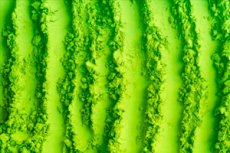
牙周炎是一种由细菌感染引起的炎症性牙龈疾病,如果不及时治疗,可能导致牙齿脱落等并发症。该疾病还与糖尿病、早产、心血管疾病、类风湿性关节炎和癌症有关。牙周炎的主要细菌病原体之一是牙龈卟啉单胞菌,它定植于牙齿表面的生物膜中,并在深层牙周袋中繁殖。
抹茶,一种精细研磨的绿茶粉,可能有助于抑制牙龈卟啉单胞菌。在《微生物学谱》杂志上,日本研究人员报告称,抹茶在实验室实验中抑制了牙龈卟啉单胞菌的生长。此外,在一项涉及45名牙周炎患者的临床试验中,使用抹茶漱口水的患者唾液样本中的牙龈卟啉单胞菌含量与研究开始时相比显著降低。
作者指出:“抹茶可能在预防和治疗牙周炎方面具有临床应用。”
茶树是一种绿茶植物,长期以来因其对细菌、真菌和病毒的潜在抗菌作用而被研究。此前一项针对小鼠的研究发现,绿茶提取物可以抑制包括大肠杆菌在内的病原体的生长。
其他研究表明,该提取物可以抑制牙龈卟啉单胞菌的生长,并减少其对口腔上皮细胞的粘附。此外,观察性研究也表明饮用绿茶与改善健康有关。
抹茶用于传统仪式以及调味饮料和糖果,由抹茶的生叶制成。
在这项新研究中,来自日本大学松户牙科学院、东京国立感染症研究所和其他机构的研究人员进行了一系列体外实验,以测试抹茶溶液对抗16种口腔细菌(包括三种牙龈卟啉单胞菌菌株)的有效性。结果发现,抹茶漱口水对口腔共生菌菌株几乎没有活性。
在两小时内,几乎所有培养的牙龈卟啉单胞菌细胞都被抹茶提取物杀死,暴露四小时后,所有细胞均死亡。这些结果表明抹茶提取物对病原菌具有杀菌活性。
随后,研究人员从日本大学松户牙科诊所招募了 45 名被诊断患有慢性牙周炎的患者进行后续临床研究。
患者被随机分为三组:一组使用大麦茶漱口,第二组使用抹茶提取物漱口,第三组使用含有用于治疗炎症的磺酸钠水合物的漱口水。干预前后采集唾液样本,并使用PCR进行分析,并指导参与者每天漱口两次。
分析显示,使用抹茶漱口水的患者牙龈卟啉单胞菌水平显著降低。其他两组患者的牙龈卟啉单胞菌水平并未出现如此显著的降低。
虽然这项新研究并不是首次研究茶衍生化合物对牙龈卟啉单胞菌的抗菌作用,但研究人员指出,它支持抹茶作为牙周炎患者治疗计划的一部分的潜在益处。

